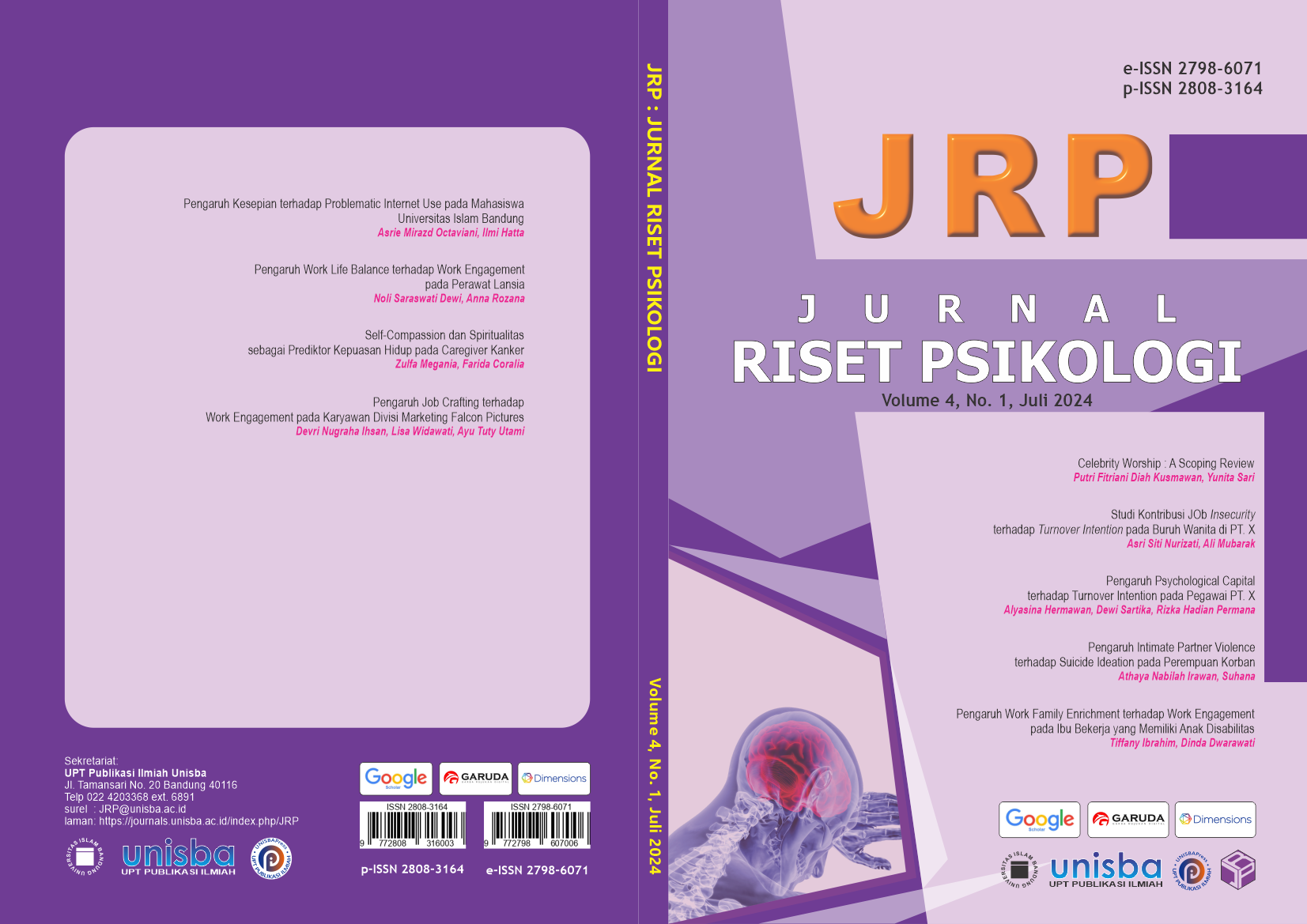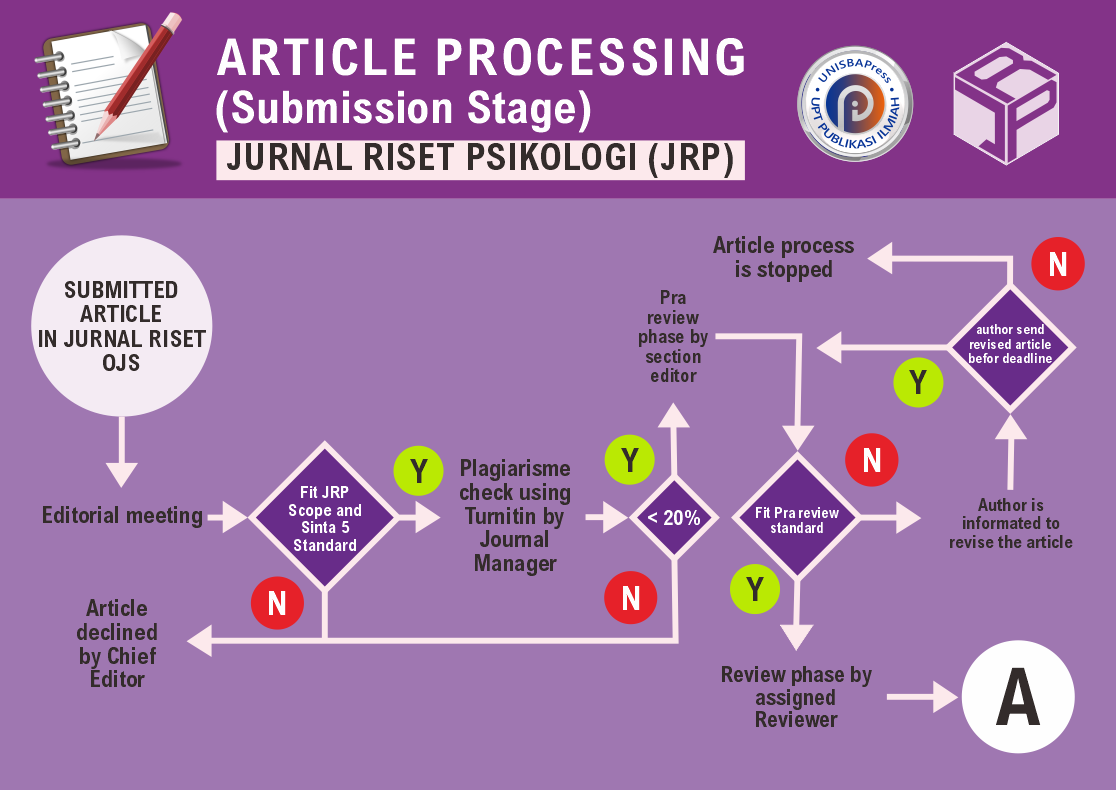Self-Compassion dan Spiritualitas sebagai Prediktor Kepuasan Hidup pada Caregiver Kanker
DOI:
https://doi.org/10.29313/jrp.v4i1.3979Keywords:
Self-Compassion, Spirituality, Life SatisfactionAbstract
Abstract. The caregiver for cancer patients is a family member providing supportive care for a family member suffering from cancer, due to various external and internal factors that can predict whether their condition will be good or bad. When self-compassion and spirituality are low in cancer caregivers, it is suspected to predict their life satisfaction. This study aims to examine self-compassion and spirituality as predictors of life satisfaction in cancer caregivers at RPKA (Rumah Pejuang Kanker Ambu). The research design uses non-experimental causality. The study subjects are all cancer caregivers at Rumah Pejuang Kanker Ambu (RPKA), totaling 34 individuals. Measurement tools used to assess self-compassion include the Self-Compassion Scale (SCS) by Neff, Spirituality using the Daily Spiritual Experience Scale (DSES) by Underwood & Teresi, and Life Satisfaction using the Satisfaction With Life Scale (SWLS) by Diener. The data analysis technique used is multiple linear regression analysis. The research results indicate that when self-compassion is low, life satisfaction decreases by 0.354. Then, when spirituality is low, life satisfaction decreases by 0.643. Self-compassion and spirituality together obtain an R-Square of 95.1% for life satisfaction in cancer caregivers at RPKA. Thus, it is known that self-compassion and spirituality simultaneously become predictors for the life satisfaction of cancer caregivers at RPKA.
Abstrak. Caregiver kanker merupakan keluarga yang memberikan perawatan suportif bagi anggota keluarga yang menderita, karena adanya berbagai macam faktor dari luar maupun dalam diri caregiver kanker yang dapat memprediksi kondisinya menjadi baik atau buruk. Ketika self-compassion dan spiritualitas pada caregiver kanker rendah diduga dapat memprediksikan kepuasan hidupnya. Penelitian ini bertujuan untuk menguji self-compassion dan spiritualitas sebagai prediktor kepuasan hidup pada caregiver kanker di RPKA. Rancangan penelitian menggunakan kausalitas non-eksperimental. Subjek penelitian ini yaitu seluruh caregiver kanker di Rumah Pejuang Kanker Ambu (RPKA) sebanyak 34 orang. Alat ukur yang digunakan untuk mengukur Self-Compassion adalah Self-Compassion Scale (SCS) dari Neff, Spiritualitas menggunakan alat ukur Daily Spiritual Experience Scale (DSES) dari Underwood & Teresi, dan Kepuasan Hidup menggunakan alat ukur Satisfaction With Life Scale (SWLS) dari Diener. Teknik analisis data yang digunakan adalah teknik analisis regresi linier berganda. Hasil penelitian menunjukkan bawa ketika self-compassion rendah, maka kepuasan hidup akan menurun sebesar 0.354. Lalu, ketika spiritualitas rendah, maka kepuasan hidup akan menurun sebesar 0.643. Self-compassion dan spiritualitas secara simultan memperolehan R-Square sebesar 95.1% terhadap kepuasan hidup pada caregiver kanker di RPKA. Sehingga diketahui self-compassion dan spiritualitas secara simultan menjadi prekdiktor bagi kepuasan hidup caregiver kanker di RPKA.
References
F. Bray, J. Ferlay, I. Soerjomataram, R. L. Siegel, L. A. Torre, and A. Jemal, “Global cancer statistics 2018: GLOBOCAN estimates of incidence and mortality worldwide for 36 cancers in 185 countries,” CA Cancer J Clin, vol. 68, no. 6, pp. 394–424, Nov. 2018, doi: 10.3322/caac.21492.
WHO, “Indonesia incidence, morality, and prevalence by cancer site,” The Global Cancer Observatory, 2020.
N. Sukmarini, “Optimalisasi Peran Caregiver Dalam Penatalaksanaan Skizofrenia,” Universitas Islam Negeri Syarif Hidayatullah Jakarta, Jakarta, 2009.
ACS, “What Is A Cancer Caregiver?,” American Cancer Society.
F. Fu, H. Zhao, F. Tong, and I. Chi, “A Systematic Review of Psychosocial Interventions to Cancer Caregivers,” Front Psychol, vol. 8, May 2017, doi: 10.3389/fpsyg.2017.00834.
E. Diener, Myths In The Science of Happiness, and Directions For Future Research. The Science of Subjective Well-being, 2008.
K. D. Neff and C. K. Germer, “A Pilot Study and Randomized Controlled Trial of the Mindful Self‐Compassion Program,” J Clin Psychol, vol. 69, no. 1, pp. 28–44, Jan. 2013, doi: 10.1002/jclp.21923.
R. Biswas-Diener, Material Wealth and Subjective Well-Being. The Science of Subjective Well-Being, 2008.
K. D. Neff, “Does Self-Compassion Entail Reduced Self-Judgment, Isolation, and Over-Identification? A Response to Muris, Otgaar, and Petrocchi (2016),” Mindfulness (N Y), vol. 7, no. 3, pp. 791–797, Jun. 2016, doi: 10.1007/s12671-016-0531-y.
Y. P. Pratiwi and F. Coralia, “Studi Mengenai Gambaran Subjective Well-Being pada Ibu Pekerja Selama Masa Pandemi Covid-19,” Jurnal Riset Psikologi, vol. 1, no. 2, pp. 140–146, Feb. 2022, doi: 10.29313/jrp.v1i2.560.
L. G. Underwood and J. A. Teresi, “The daily spiritual experience scale: development, theoretical description, reliability, exploratory factor analysis, and preliminary construct validity using health-related data,” Annals of Behavioral Medicine, vol. 24, no. 1, pp. 22–33, Feb. 2002, doi: 10.1207/S15324796ABM2401_04.
D. F. Khairunnisa and H. Noor, “Hubungan Self-Compassion Dengan Life Satisfaction Pada Remaja Low Vision Di SLBN A Kota Bandung,” in Prosiding Psikologi, Bandung, 2017.
U. Astri, “eran Self-Compassion Terhadap Kepuasan Hidup Driver Ojek Online Selama Masa New Normal di Kota Palembang,” Universitas Sriwijaya, Inderalaya, 2021.
C. N. Aulia and M. N. M. Rahayu, “Apakah Terdapat Kaitan Antara Self Compassion dan Life Satisfaction Pada Remaja Panti Asuhan?,” Psikoborneo: Jurnal Ilmiah Psikologi, vol. 10, no. 4, p. 732, Nov. 2022, doi: 10.30872/psikoborneo.v10i4.9243.
S. Kim and G. B. Esquivel, “Adolescent spirituality and resilience: Theory, research, and educational practices,” Psychol Sch, vol. 48, no. 7, pp. 755–765, Aug. 2011, doi: 10.1002/pits.20582.
R. F. Carranza Esteban, J. E. Turpo-Chaparro, O. Mamani-Benito, J. H. Torres, and F. S. Arenaza, “Spirituality and religiousness as predictors of life satisfaction among Peruvian citizens during the COVID-19 pandemic,” Heliyon, vol. 7, no. 5, p. e06939, May 2021, doi: 10.1016/j.heliyon.2021.e06939.
K. NEFF, “Self-Compassion: An Alternative Conceptualization of a Healthy Attitude Toward Oneself,” Self and Identity, vol. 2, no. 2, pp. 85–101, Apr. 2003, doi: 10.1080/15298860309032.
E. Diener, R. A. Emmons, R. J. Larsen, and S. Griffin, “The Satisfaction With Life Scale,” J Pers Assess, vol. 49, no. 1, pp. 71–75, Feb. 1985, doi: 10.1207/s15327752jpa4901_13.













